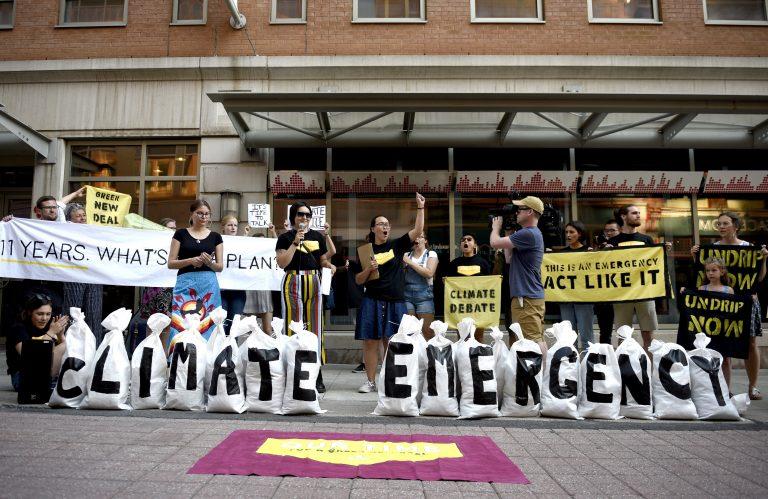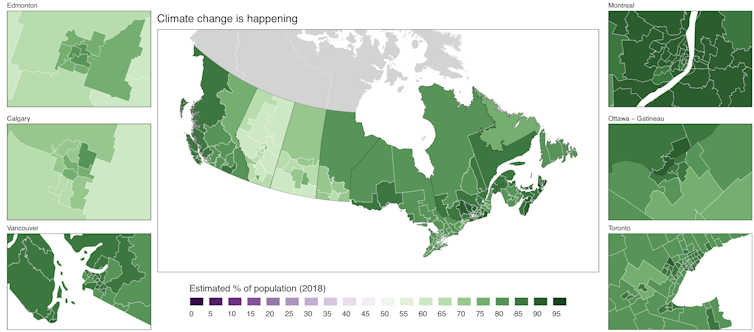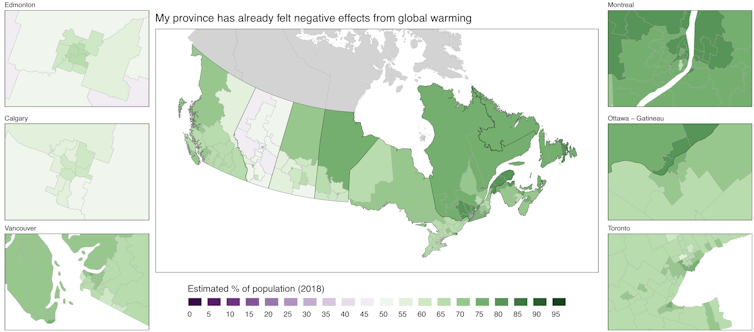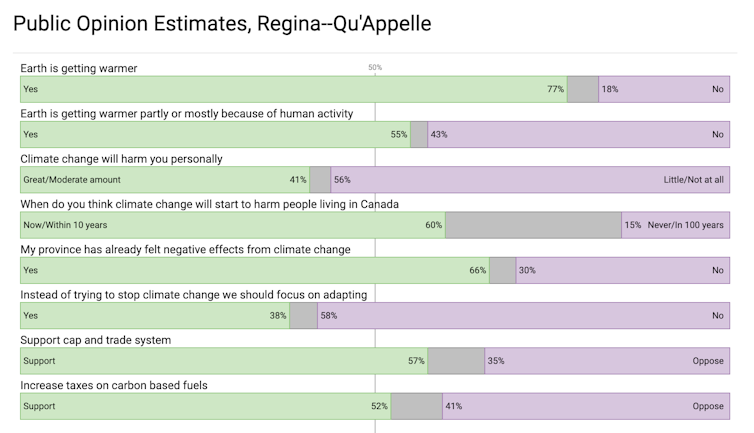Canadians in every riding support climate change action
New data from researchers at the Université de Montréal and University of California Santa Barbara shows how concerned Canadians are about climate change before the election

Sandbags symbolizing the link between climate change and local flooding are placed outside the CBC Ottawa newsroom during a rally calling for the public broadcaster to host a federal leader’s debate on climate change and a Green New Deal for Canada for the 2019 election, on Wednesday, July 17, 2019. (CP/Justin Tang)
Share
ssociate professor within the département de science politique at Université de Montréal and ssistant professor of political science at the University of California, Santa Barbara.
Canada is gearing up for a big election this fall and climate policy will likely be at the centre of debate. Prime Minister Justin Trudeau’s Liberals are trumpeting their carbon pricing policy, while Andrew Scheer’s Conservatives want to get rid of it. Meanwhile, Elizabeth May and her newly relevant Greens think Canada must do more to manage the climate crisis.
But where do Canadian voters stand on this issue?
Our research team, based at the Université de Montréal and the University of California Santa Barbara, has new public opinion data to answer this question. Using recent statistical and political science advances, we can estimate Canadian opinion in every single riding across the country (except for the less densely populated territories, where data collection is sparse). And we’ve released on online tool so anyone can see how their local riding compares to others across the country.
Our results reinforce what is increasingly clear: climate change is on the minds of Canadians, and not just in urban or coastal communities. A majority of Canadians in every single riding believe the climate is changing. The highest beliefs are in Halifax, where 93 per cent of the public believe climate change is happening.

And a majority of Canadians in all but three ridings think their province has already experienced the impacts of climate change. These beliefs are particularly high in Québec, where 79 per cent feel the impacts of climate change have already arrived.
Canadians also want to see the government take the climate threat seriously. A majority of voters support emissions trading. Carbon taxation is more divisive, yet more people support carbon taxation than don’t in 88 per cent of Canadian ridings. And the handful of ridings that don’t support the Trudeau government’s carbon pricing policy—Fort McMurray-Cold Lake, for example—are already in Conservative hands.
In other words, the path to a majority government (or even a minority government) goes through many ridings where Canadians are worried about climate change and want the government to take aggressive action.
Compared to the United States, the Canadian public believes climate change is happening in far higher shares. Even Canadian ridings where belief in climate change is the lowest have comparable beliefs to liberal states like Vermont and Washington. Overall Canadian support for a carbon tax is higher than support for a carbon tax in California, often thought of as the most environmentally progressive U.S. state.

Importantly, support for specific climate policies remains high in provinces that have already implemented climate laws. For instance, support for a carbon tax in British Columbia, where this policy was introduced in 2008, is the second highest in the country at 61 per cent (Prince Edward Island has the highest support). Similarly, support for emissions trading is second highest in Québec, again just behind P.E.I., where a carbon market was implemented in 2013.
We don’t find evidence of a backlash to carbon taxes or emissions trading—Canadians living in provinces with substantive climate policies continue to support them. Instead, we find substantial support for climate action in the ridings of Canadian politicians who have done the most to undermine Canada’s climate policy.
Ontario Premier Doug Ford’s provincial riding matches up with the federal riding of Etobicoke North, where 62 per cent of the public supports emissions trading. In other words, Ford ignored the majority will of his own constituents when he acted to repeal Ontario’s policy last year.
The same is true federally. In Scheer’s own riding of Regina-Qu’Appelle, support for carbon taxation is at 52 per cent. Only 41 per cent of Scheer’s own constituents oppose a carbon tax. He too is offside with the people he represents.
Our results emphasize how the media can sometimes misinterpret electoral mandates. In Ontario, Doug Ford promised to repeal the province’s emissions trading scheme and won. But the former Conservative leader, Patrick Brown, supported carbon pricing while enjoying a comfortable lead in the polls.
There are lots of reasons why Canadians choose to change their government, but opposition to carbon pricing hasn’t been one of them.
Climate science is clear on the need to decrease greenhouse gas emissions rapidly to avert the most disastrous consequences of climate change. As a northern country, climate impacts in Canada are already larger than in other places.
Our research, which the public can explore, shows that Canadians everywhere, from the most Conservative to the most Liberal ridings, are united in understanding that climate change poses a major threat to the people and places they cherish. The coming election will provide an opportunity for Canadians have a say in the future of climate policy in their country, and all Canadian politicians should take note.
This article is republished from The Conversation under a Creative Commons license. Read the original article.
MORE ABOUT CLIMATE CHANGE:
- The problem with Joe Oliver’s soothing words on climate change
- For David Koch, the earth is his funeral pyre
- We must have our beef
- A commitment to covering climate change
![]()
